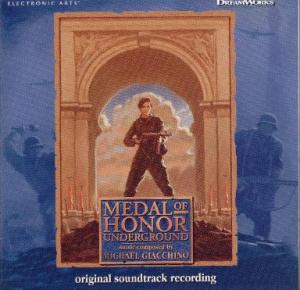The biggest surprise that I had when I opened this album was to find myself
quoted from my review of the first album Medal of Honour that Michael Giacchino
released last year. I said of that album, "On the strength of this one release,
Michael Giacchino should go from being a virtual unknown to taking a major
step to becoming one of the very top film composers of the next few decades."
This new follow-up album of his, Medal of Honour, Underground confirms
my opinion.
This new DreamWorks game is another World War II adventure story pitting
Manon, the O.S.S. heroine against the evil Nazis. Her explosive adventures
take from deep beneath Paris, to North Africa, Greece, Germany and Italy
thus giving Giacchino the opportunity to inject local colour along the way
including the use of some Gregorian mode-type writing in Last Rites (at Monte
Casino) and with something of Respighi here too.
Once again I was impressed with the apparent ease that Giacchino tackles
a broad, very detailed canvass for an action film creating a sound world
that grips and holds the imagination with effects that imaginatively avoid
the usual traps of the genre. His musical structures are rich and complex
and multi-stranded, but each strand is perfectly balanced and placed within
the texture so that you have the impression of a vibrantly coloured tapestry.
His scoring for voices impresses equally. I can only think of three modern
film composers who can offer such a rich and satisfying sound palate: John
Williams (to whom Giacchino makes respectful obeisance - and to Bernard
Herrmann), Elmer Bernstein and Jerry Goldsmith. I can think of no greater
tribute.
There is but one complaint. This comes from me being too old a reviewer and
remembering too many themes. It is meant as no reflection on Michael. One
has to suppose that the main character of this new game, Manon, inspired
by the exploits of Hélène Déschamps is French. Michael
Ciacchino has created a theme for her that in its first few notes irresistibly
makes me want to anticipate the old pop song, 'Arrivederci Roma' which I
found disconcerting because she is French and so much of the action, particularly
at the beginning and end, takes place in Paris. (Although the turning-point
battle of Monte Casino south of Rome is an integral part of the game's plot).
This is a thrilling and intense, and evocative score that really engages
the senses. I hope that Giacchino is given the chance to score something
different now. I would hate to think that such a talent should be squandered
on scoring 'action' films exclusively.
Incidentally, the erudite booklet notes were scribed by Paul Tonks the well-known
film music commentator and one of our valued Film Music on the Web
reviewers
Ian Lace

I invited Michael Giacchino to respond about Arrivederci Roma,
he wrote:-
Arrivederci Roma: Someone at the sessions mentioned the same thing about
the first three notes. I hadn't heard the song that he was talking about
(or perhaps I had and not remembered it). The main theme has two distinct
variations. The variation that you are speaking of (variation "B") was born
out of the main theme (variation "A"), which is a theme in which the first
two notes lead into a Major Key. Variation "B" is defined by the first two
notes lead into a minor 6th chord, representing a more intimate moment with
the main character (whereas the major key version represents more of a French
Patriotism point of view). I guess that minor shift is what reminds people
of the Roma song - Michael Giacchino.




